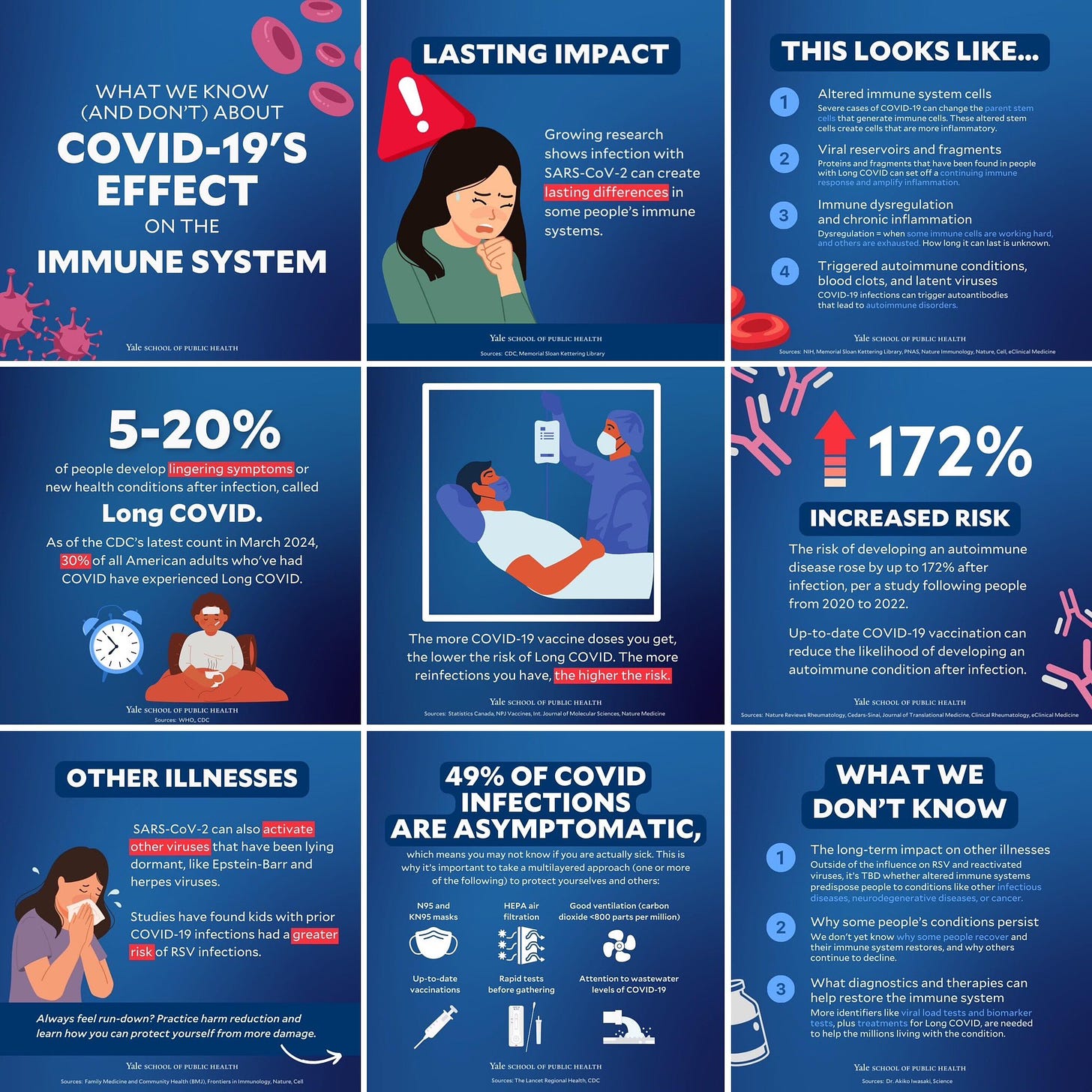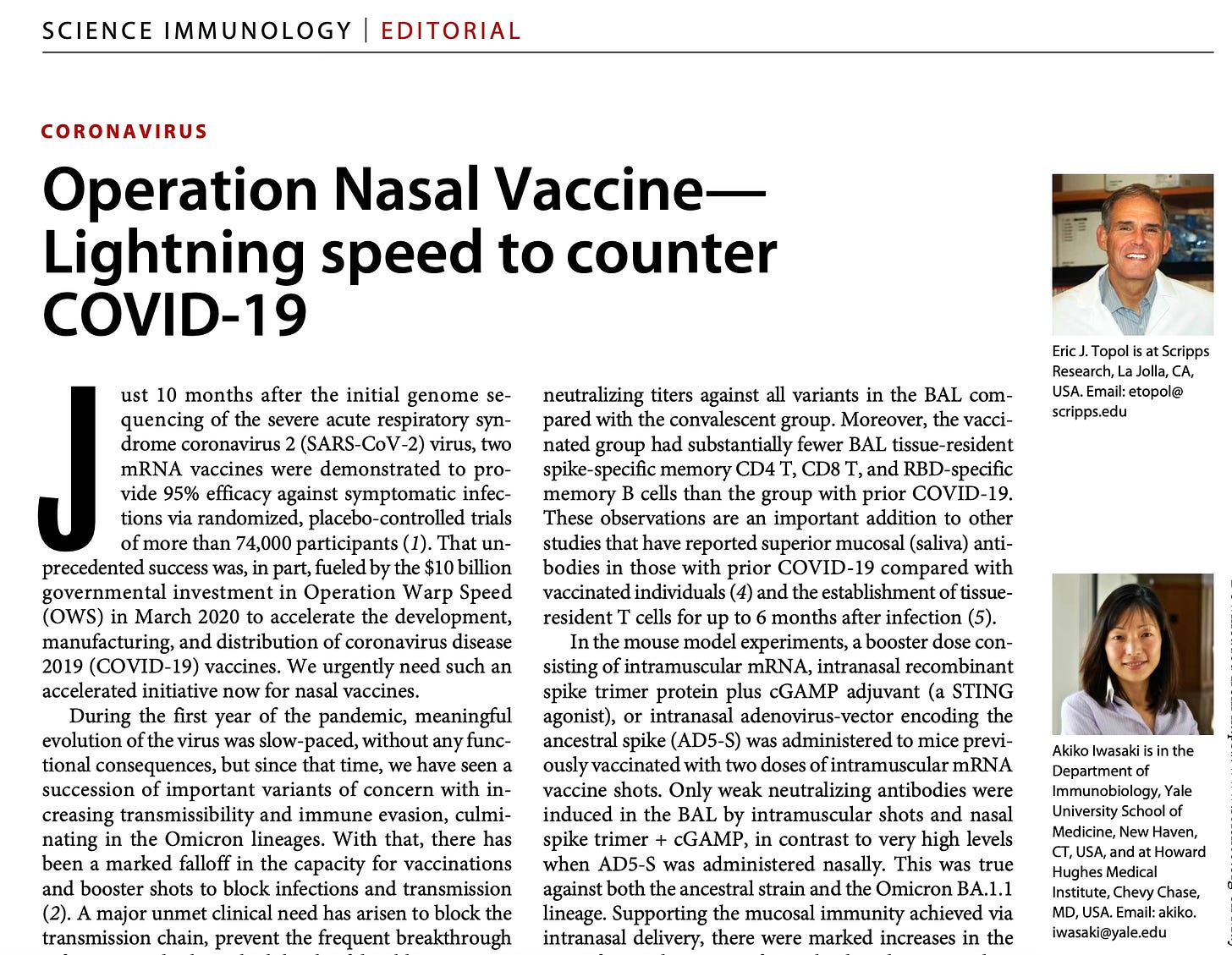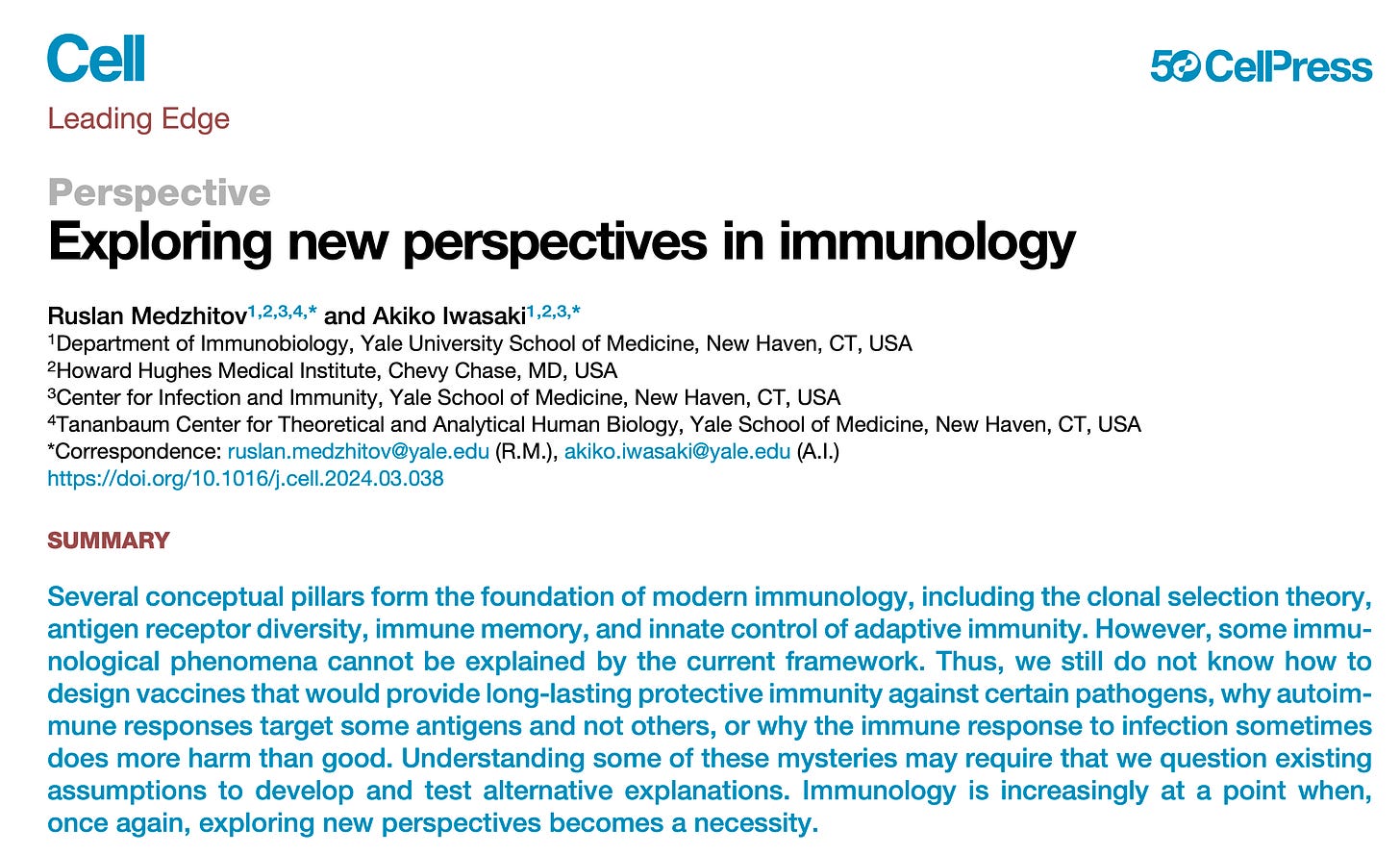If there’s one person you’d want to talk to about immunology, the immune system and Covid, holes in our knowledge base about the complex immune system, and where the field is headed, it would be Professor Iwasaki. And add to that the topic of Women in Science. Here’s our wide-ranging conversation.
A snippet of the video, Full length Ground Truths videos are posted here and you can subscribe.
Transcript with many external link and links to the audio, recorded 30 April 2024
Eric Topol (00:06):
Hello, it's Eric Topol and I'm really thrilled to have my friend Akiko Iwasaki from Yale, and before I start talking with Akiko, I just want to mention there aren't too many silver linings of the pandemic, but one for me was getting to know Professor Iwasaki. She is my go-to immunologist. I've learned so much from her over the last four years and she's amazing. She just, as you may know, she was just recently named one of the most influential people in the world by TIME100. [and also recognized this week in TIME 100 Health]. And besides that, she's been elected to the National Academy of Medicine, National Academy of Sciences. She's the president of the American Association of Immunologists and she's a Howard Hughes principal investigator. So Akiko, it's wonderful to have you to join into an extended discussion of things that we have of mutual interest.
Akiko Iwasaki (01:04):
Thank you so much, Eric, for having me. I equally appreciate all of what you do, and I follow your blog and tweets and everything. So thank you Eric.
Eric Topol (01:14):
Well, you are a phenom. I mean just, that's all I can say because I think it was so appropriate that TIME recognize your contributions, not just over the pandemic, but of course throughout your career, a brilliant career in immunology. I thought we'd start out with our topic of great interest on Long Covid. You've done seminal work here and this is an evolving topic obviously. I wonder what your latest thoughts are on the pathogenesis and where things are headed.
Long Covid
Akiko Iwasaki (01:55):
Yeah, so as I have been saying throughout the pandemic, I think that Long Covid is not one disease. It's a collection of multiple diseases and that are sort of ending up in similar sets of symptoms. Obviously, there are over 200 symptoms and not everyone has the same set of symptoms, but what we are going for is trying to understand the disease drivers, so persistent viral infection is one of them. There are overwhelming evidence for that theory now, all the way from autopsy and biopsy studies to looking at peripheral blood RNA signatures as well as circulating spike protein and nucleocapsid proteins that are detected in people with Long Covid. Now whether that persistent virus or remnants of virus is driving the disease itself is unclear still. And that's why trials like the one that we are engaging with Harlan Krumholz on Paxlovid should tell us what percentage of the people are suffering from that type of driver and whether antivirals like Paxlovid might be able to mitigate those. If I may, I'd like to talk about three other hypotheses.
Eric Topol (03:15):
Yeah, I'd love for you to do that.
Akiko Iwasaki (03:18):
Okay, great. So the second hypothesis that we've been working on is autoimmune disease. And so, this is clearly happening in a subset of people, again, it's a heterogeneous disease, but we can actually not only look at reactogenicity of antibodies from people with Long Covid where we can transfer IgG from patients with Long Covid into an animal, a healthy animal, and really measure outcomes of a pathogenesis. So that's a functional evidence that antibodies in some people with Long Covid is really actually causing some of the damages that are occurring in vivo. And the third hypothesis is the reactivation of herpes viruses. So many of us adults have multiple latent herpes virus family members that are just dormant and are not really causing any pathologies. But in people with Long Covid, we're seeing elevated reactivation of viruses like Epstein-Barr virus (EBV) or Varicella-zoster virus (VZV) and that may again be just a signature of Long Covid, but it may also be driving some of the symptoms that people are suffering from.
(04:32):
So that's again, we see the signature over and over, not just our group, but multiple other groups, Michael Peluso's group, Jim Heath, and many others. So that's also an emerging evidence from multiple groups showing that. And finally, we think that inflammation that occurs during the acute phase can sort of chronically change some tissue tone. For instance, in the brain with Michelle Monje’s team, we developed a sort of localized mild Covid model of infection and showed that changes in microglia can be seen seven weeks post infection even though the virus is completely gone. So that means that inflammation that's established as a result of this initial infection can have prolonged sequence and sequela within the person and that may also be driving disease. And Eric, the reason we need to understand these diseases separately is because not only for diagnostic purposes, but for therapeutic purposes because to target a persistent virus is very different approach from targeting autoantibodies, for example.
Eric Topol (05:49):
Well, that's great. There's a lot to unpack there as you laid out four distinct paths that could result in the clinical syndrome and sequelae. I think you know I had the chance to have a really fun conversation with Michelle about their joint work that you've done, and she reminded me how she made a cold call to you to start as a collaboration, which I thought was fantastic. Look what that yielded. But yeah, this is fascinating because as I think you're getting at is that it may not be the same pathogenesis in any given individual so that all these, and even others might be operative. I guess maybe I first delve into the antibody story as you're well aware, we see after people get Covid a higher rate of autoimmune diseases crop up, which is really interesting because it seems to rev up self-directed immune response. And this I think many people haven't really noted yet, although obviously you're well aware of this, it's across all the different autoimmune diseases, connective tissue disease, not just one in particular. And it's, as you say, the idea that you could take the blood from a person suffering from Long Covid and give it to an experimental animal model and be able to recapitulate some of the abnormalities, it's really pretty striking. So the question I guess is if you were to do plasmapheresis and try to basically expunge these autoantibodies, wouldn't you expect people to have some symptomatic benefit pretty rapidly or is it just that the process is already far from the initiating step?
Akiko Iwasaki (07:54):
That's a great question. Plasmapheresis may be able to transiently improve the person if they're suffering from these autoantibody mediated diseases. People have reported, for example, IVIG treatment has dramatically improved their symptoms, but not in everybody. So it's really critical to understand who's suffering from this particular driver and appropriately treat those people. And there are many other very effective therapies in autoimmune disease field that can be repurposed for treating these patients as well.
Eric Topol (08:34):
The only clinical trial that has clicked so far, interestingly, came out of Hong Kong with different types of ways to manipulate the gut microbiome, which again, you know better than me is a major modulator of our immune system response. What are your thoughts about taking advantage of that way to somehow modulate this untoward immune response in people with this condition?
Akiko Iwasaki (09:07):
Yeah, so that is an exciting sort of development, and I don't mean to discount the importance of microbiome at all. It's just the drivers that are mentioning are something that can be directly linked to disease, but certainly dysbiosis and translocation of metabolites and microbiome itself could trigger Long Covid as well. So it's something that we're definitely keeping our eyes on. And as you say, Eric, the immune system is in intimate contact with the gut microbiome and also the gut is intimate contact with the brain. So there's a lot of connections that we really need to be paying attention to. So yeah, absolutely. This is a very exciting development.
Eric Topol (09:57):
And it is intriguing of course, the reactivation of viruses. I mean, we’ve learned in recent years how important EBV is in multiple sclerosis (MS). The question I have for you on that pathway, is this just an epiphenomena or do you actually think that could be a driving force in some people?
Akiko Iwasaki (10:19):
Yeah, so that's really hard to untangle in people. I mean, David Putrino and my team we're planning a clinical trial using Truvada. Truvada obviously is an HIV drug, but it has reported antiviral activity to Epstein-Barr virus (EBV) and others. So potentially we can try to interrogate that in people, but we're also developing mouse models that can sort of recapitulate EBV like viral reactivation and to see whether there's any sort of causal link between the reactivation and disease process.
Eric Topol (10:57):
Right now, recently there's been a bunch of anecdotes of people who get the glucagon-like peptide one (GLP-1) drugs which have a potent anti-inflammatory, both systemic and in the brain. I'd love to test these drugs, but of course these companies that make them or have other interests outside of Long Covid, do you think there's potential for a drug like that?
Akiko Iwasaki (11:23):
Yeah, so those drugs seem to have a lot of miraculous effects on every disease. So obviously it has to be used carefully because many people with Long Covid have issues with liver functions and other existing conditions that may or may not be conducive to taking those types of GLP-1 agonists. But in subset of people, maybe this can be tried, especially due to the anti-inflammatory properties, it may benefit again, a subset of people. I don't expect a single drug to cure everyone. That would be pretty amazing, but unlikely.
Eric Topol (12:09):
Absolutely. And it's unfortunate we are not further along in this whole story of clinical trials, testing treatments and applauding your efforts with my friend Harlan there to get into the testing which we had hoped RECOVER was going to do with their more than billion dollars or allocation, which didn't get us too far in that. Now before we leave Long Covid, which we could speak about for hours, I mean it's so darn important because so many people are really out there disabled or suffering on a daily basis or periodically they get better and then get worse again. There's been this whole idea that, oh, it's going away and that reinfections don't pose a threat. Maybe you could straighten that story out because I think there seems to be some miscues about the risk of Long Covid even as we go along with the continued circulating virus.
Akiko Iwasaki (13:11):
Right, so when you look at the epidemiological evidence of Long Covid, clearly in the beginning when we had no vaccines, no antivirals, no real good measure against Covid, the incident of developing Long Covid per infection was higher than a current date where we do have vaccines and Omicron may have changed its property significantly. So if you compare, let's say the Delta period versus Omicron period, there seems to be a reduced risk per infection of Long Covid. However, Omicron is super infectious. It's infected millions of people, and if you look at the total number of people suffering from Long Covid, we're not seeing a huge decline there at all because of the transmissibility of Omicron. So I think it's too early for us to say, okay, the rates are declining, we don't need to worry about it. Not at all, I think we still have to be vigilant.
(14:14):
We need to be up to date on vaccines and boosters because those seem to reduce the risk for Long Covid and whether Paxlovid can reduce the rate of Long Covid at the acute phase for the high risk individual, it seems to be yes, but for people who are not at high risk may or may not be very effective. So again, we just need to be very cautious. It's difficult obviously, to be completely avoiding virus at this time point, but I think masking and anything you can do, vaccination boosters is going to be helpful. And a reinfection does carry risk for developing Long Covid. So that prior infection is not going to prevent Long Covid altogether, even though the risk may be slightly reduced in the first infection. So when you think about these risks, again we need to be cognizant that reinfection and some people have multiple infections and then eventually get Long Covid, so we're just not safe from Long Covid yet.

Nasal Vaccines and Mucosal Immunity
Eric Topol (15:24):
Right. No, I think that's the problem is that people have not acknowledged that there's an ongoing risk and that we should continue to keep our guard up. I want to applaud you and your colleagues. You recently put out [Yale School of Public Health] this multi-panel about Covid, which we'll post with this podcast that gave a lot of the facts straight and simple diagrams, and I think this is what you need is this is kind of like all your threads on Twitter. . They're always such great educational ways to get across important information. So now let's go onto a second topic of great mutual interest where you've also been a leader and that's in the mucosal nasal vaccine story. I had the privilege of writing with you a nice article in Science Immunology back in 2022 about Operation Nasal Vaccine, and unfortunately we don't have a nasal vaccine. We need a nasal vaccine against Covid. Where do we stand with this now?
Akiko Iwasaki (16:31):
Yeah, so you're right. I mean nasal vaccines, I don't really know what the barrier is because I think the preclinical models all support the effectiveness against transmission and infection and obviously disease. And there is a White House initiative to support rapid development of next generation vaccine, which includes mucosal vaccine, so perhaps that's sort of pushing some of these vaccine candidates forward. You're probably more familiar than me about those kinds of events that are happening. But yeah, it's unfortunate that we don't have an approved mucosal booster vaccine yet, and our research has shown that as simple as a spray of recombinant spike protein without any adjuvants are able to restimulate immune response and then establish mucosal immunity in the nasal cavity, which goes a long way in preventing infection as well as transmission. So yeah, I mean I'm equally frustrated that things like that don't exist yet.
The Neomycin and Neosporin Surprise
Eric Topol (17:52):
Well, I mean the work that you and many other groups around the world have published on this is so compelling and this is the main thing that we don't have now, which is a way to prevent infection. And I think most of us would be very happy to have a spray that every three or four months and gave us much higher levels of protection than we're ever going to get from shots. And your whole concept of prime and spike, I mean this is something that we could have had years ago if there was a priority, and unfortunately there never has been. Now, the other day you came with a surprise in a paper on Neomycin as an alternate or Neosporin ointment. Can you tell us about that? Because that one wasn't expected. This was to use an antibiotic in a way to reduce Covid and other respiratory virus.
Akiko Iwasaki (18:50):
Right. So yeah, that's a little known fact. I mean, of course widespread use of antibiotics has caused some significant issues with resistance and so on. However, when you look at the literature of different types of antibiotics, we have reported in 2018 that certain types of antibiotics known as aminoglycoside, which includes Neosporin or neomycin, has this sort of unintended antiviral property by triggering Toll-like receptor 3 in specialized cell types known as conventional dendritic cell type 1. And we published that for a genital herpes model that we were working on at the time. But because it's acting on the host, the Toll-like receptor 3 on the host cell to induce interferon and interferon stimulated genes to prevent the replication of the virus, we knew that it could be pan-viral. It doesn't really matter what the virus is. So we basically leverage that discovery that was made by a postdoc Smita Gopinath when she was in the lab to see if we can use that in the nasal cavity.
(20:07):
And that's what Tianyang Mao, a former graduate student did, in fact. And yeah, little spray of neomycin in the nose of the mice reduce this infection as well as disease and can even be used to treat shortly after the infection disease progress and using hamster models we also showed that hamsters that are pretreated with neomycin when they were caged with infected hamsters, the transmission rate was much reduced. And we also did with Dr. Charles Dela Cruz, a small clinical trial, randomized though into placebo and Neosporin arms of healthy volunteers. We asked them to put in a pea size amount of Neosporin on a cotton swab into the nose, and they were doing that twice a day for seven days. We measured the RNA from the nose of these people and indeed see that more than half the participants in the Neosporin group had elevated interferon stimulated genes, whereas the control group, which were given Vaseline had no response. So this sort of shows the promise of using something as generic and cheap as Neosporin to trigger antiviral state in the nose. Now it does require a much larger trial making sure that the safety profiles there and effectiveness against viral infection, but it's just a beginning of a story that could develop into something useful.
New Frontiers in Immunology and Tx Cells
Eric Topol (21:51):
Yeah, I thought it was fascinating, and it does bring up, which I think has also been underdeveloped, is our approaches for interferon a frontline defense where augmenting that, just getting that exploiting the nasal mucosa, the entry site, whether it be through that means or of course through even more potent a nasal vaccine, it's like a missing, it's a hole in our whole defense of against this virus that's led to millions of people not just dying, but of course also sick and also with Long Covid around the world. So I hope that we'll see some progress, but I thought that was a really fascinating hint of something to come that could be very helpful in the meantime while we're waiting for specific nasal vaccines. Now added to all these things recently, like last week you published a paper in Cell with your husband who's in the same department, I think at Yale. Is that right? Can you tell us about that and this paper about the whole new perspectives in immunology?
Akiko Iwasaki (23:05):
Yeah, so my husband Ruslan Medzhitov is a very famous immunologist who's in the same department, and we've written four or five review and opinion pieces together over the years. This new one is in Cell and it's really exploring new perspectives in immunology. We were asked by the editors to celebrate the 50th anniversary of the Cell journal with a perspective on the immune system. And the immune response is just a beautiful system that is triggered in response to specific pathogens and can really provide long-term or even sometimes lifelong immunity and resistance against pathogens and it really saves our lives. Much has been learned throughout the last 20, 30 years about the innate and adaptive immune system and how they're linked. In this new perspective, we are trying to raise some issues that the current paradigm cannot explain properly, some of the mysteries that are still remaining in the immune system.
(24:22):
And we try to come up with new concepts about even the role of the immune system in general. For instance, is the immune system only good for fighting pathogens or can it be repurposed for conducting normal physiology in the host? And we came up with a new subset of T-cells known as, or we call it Tx cells, which basically is an interoceptive type of T-cells that monitor homeostasis in different tissues and are helping with the normal process of biology as opposed to fighting viruses or bacteria or fungi. But these cells, when they are not appropriately regulated, they are also the source of autoimmune diseases because they are by design reactive against auto antigens. And so, this is a whole new framework to think about, a different arm of the immune function, which is really looking inside of our body and not really fighting against pathogens, but we believe these cells exist, and we know that the counterpart of Tx cells, which is the T regulatory cells, are indeed well known for its physiological functions. So we're hoping that this new perspective will trigger a new set of approaches in the field to try to understand this interceptive property of T-cells.
Eric Topol (25:59):
Yeah, well, I thought it was fascinating, of course, and I wanted to get into that more because I think what we're learning is this immune system not only obviously is for cancer whole. We're only starting to get warmed up with immunotherapy where checkpoint inhibitors were just the beginning and now obviously with vaccines and all these different ways that we can take the CAR-T cells, engineered T-cells, take the immune system to fight cancer and potentially to even use it as a way to prevent cancer. If you have these, whether it's Tx or Tregs or whatever T-cells can do this. But even bigger than that is the idea that it's tied in with the aging process. So as you know, again, much more than I do, our senescent immune cells are not good for us. And the whole idea is that we could build immune resilience if we could somehow figure out these mysteries that you're getting at, whereby we get vulnerable just as we were with Covid. And as we get older, we get vulnerable to not just infections, but everything going wrong, whether it's the walls of our arteries or whether it's the cancer or the immunity that's going on in our brain for Alzheimer's and neurodegenerative diseases. How can we fix the immune system so that we age more healthily
The Immune System and Healthy Aging
Akiko Iwasaki (27:37):
Oh yeah. A lot of billionaires are also interested in that question and are pouring money into this question. It's interesting, but when you think about the sort of evolutionary perspective, we humans are only living so long. In the very recent decades, our life expectancy used to be much shorter and all we had to survive was to reproduce and generate the next progeny. But nowadays, because of this amazing wealth and health interventions and food and everything else, we're just living so much longer than even our grandparents. The immune system didn't evolve to deal with such one to begin with. So we were doing fine living up to 30 years of age or whatever. But now that we're living up to a hundred years, the immune system isn't really designed to keep up with this kind of stressors. But I think you're getting at a very important kind of more engineering questions of how do we manipulate the immune system or rejuvenate it so that we can remain healthy into the later decades? And it is well known that the immune system itself ages and that our ability to produce new lymphocytes, for example, decline over time and thymus that is important for T-cell development shrinks over time. And so anatomically it's impossible to help stop that process. However, is there a way of, for example, transferring some factors or engineering the immune cells to remain healthy and even like hematopoiesis itself can be manipulated to perhaps rejuvenate the whole immune system in their recent papers showing that. So this is a new frontier.
Eric Topol (29:50):
Do you think that some point in the future, we'll ex vivo inject Yamanaka factors into these cell lines and instead of this idea that you know get young plasma to old folks, and I mean since we don't know what's in there and it doesn't specifically have an effect on immune cells, who knows how it's working, but do you foresee that that might be a potential avenue going forward or even an in vivo delivery of this?
Akiko Iwasaki (30:22):
Yeah, it's not impossible, right? There are really rapidly evolving technologies and gene therapies that are becoming online. So it's not impossible to think about engineering in situ as you're suggesting, but we also have to be certain that we are living longer, but also healthy. So we do have to not only just deal with the aging immune system, but preventing neurodegenerative diseases and so on. And the immune system may have a role to play there as well. So there's a lot of, I mean, I can't think of a non-genetically mediated disease that doesn't involve the immune system.
Eric Topol (31:03):
Sure. No, I mean, it's just, when I think about this, people keep talking about the digital era of digital biology, but I actually think of it more as digital immunobiology, which is driving this because it's center stage and in more and more over time. And the idea that I'm concerned about is that we could rejuvenate the relevant immune cells or the whole immune response, but then it's such a delicate balance that we could actually wind up with untoward, whether it's autoimmune or overly stimulated immune system. It's not such a simple matter, as I'm sure you would agree. Now, this gets me to a broader thing which you've done, which is a profound contribution in life science and medicine, which is being an advocate for women in science. And I wonder if you could speak to that because you have been such a phenomenal force propelling the importance of women in science and not just doing that passively, but also standing up for women, which is being an activist is how you get things to change. So can you tell us about your thoughts there?
An Activist for Women in Science
Akiko Iwasaki (32:22):
Yeah, so I grew up in Japan, and part of the reason I left Japan at the age of 16 was that I felt very stifled because of the societal norm and expectation of what a woman should be. And I felt like I didn't have the opportunity to develop my skills as a scientist remaining in Japan. And maybe things have changed over the years, but at the time when I was growing up, that's how I felt. And so, I was very cognizant of biases in society. And so, in the US and in Canada where I also trained, there's a lot less barrier to success, and we are able to do pretty much anything we want, which is wonderful, and that's why I think I'm here. But at the same time, the inequity still exists, even in pay gaps and things like that that are easy to fix but are still kind of insidious and it's there.
(33:32):
And Yale School of Medicine has done a great job partly because of the efforts of women who spoke up and who actually started to collect evidence for pay gap. And now there's very little pay gap because there's active sort of involvement of the dean and everyone else to ensure equity in the medical school. But it's just a small segment of the society. We really need to expand this to other schools and making sure that women are getting paid equally as men in the same ranks. And also, I see still some sexual harassment or more just toxic environment for people in general in academia. Some PIs get away with a lot of behavior that's not conducive to a healthy environment, so I have written about that as well and how we can have antidotes for such toxic environments. And it really does require the whole village to act on it. It's not just one person speaking up. And there should be measures placed to make sure that those people who does have this tendency of abusive behavior that they can get training and just being aware of these situations and corrective behavior. So I think there's still a lot of work left in academia, but things have obviously improved dramatically over the last few decades, and we are in a very, very good place, but we just have to keep working to achieve true equity.
Why Don’t We Have Immunome Check-Ups?
Eric Topol (35:25):
Well applauding your efforts for that, and I'm still in touch with that. We got a ways to go, and I hope that we'll see steady and even more accelerated and improvement to get to parity, which is what it should be. And I really think you've been a model for doing this. It isn't like you aren't busy with everything else, so to fit that in is wonderful. In closing up, one of the things that I wonder about is our ability to assess back to the immune system for a moment isn't what it should be. That is we do a CBC and we have how many lymphocytes, how many this, why don't we have an immunome, why doesn’t everybody serially have an immune system checkup? Because that would tell us if we’re starting to go haywire and then maybe hunt for reactivated viruses or what’s going on. Do you foresee that we could ever get to a practical immunome as we go forward? Because it seems like it’s a big missing link right now.
Akiko Iwasaki (36:33):
Yeah, I think that’s a great idea. I mean, I’ll be the first one to sign up for the immunome.
Eric Topol (36:40):
But I’m depending on you to make it happen.
Akiko Iwasaki (36:44):
Well, interestingly, Eric, there are lots of amazing technologies that are developed even during the pandemic, which is monitoring everything from antibody reactivity to reactivated viruses to the cytokines to every cell marker you can imagine. So the technologies out there, it’s just I think a matter of having the right set of panels that are relatively affordable because some of these things are thousands of dollars per sample to analyze, and then of course clinical validation, something that’s CLIA approved, and then we can start to, I guess the insurance company needs to also cover this, right? So we need to demonstrate the benefit to health in the long run to be able to afford this kind of immunome analysis. But I think that very wealthy people can already get this done.
Eric Topol (37:43):
Yeah, well, we want to make it so it's a health equity story, not of course, only for the crazy ones that are out there that are taking 112 supplements a day and whatnot. But it's intriguing because I think we might be able to get ahead of things if we had such an easy means. And as you said during the pandemic, for example, my friends here in La Jolla at La Jolla Immunology did all kinds of T-cell studies that were really insightful and of course done with you and others around the country and elsewhere to give us insights that you didn't get just from neutralizing antibodies. But it isn't something that you can get done easily. Now, I think this immunome hopefully will get us to another level in the future. One of the most striking things I've seen in our space clinically before wrapping up is to take the CD19 CAR T therapies to deplete the B cells of people with lupus, systemic sclerosis and other conditions, and completely stop their autoimmune condition. And when the B cells come back, they're not fighting themselves. They're not self-directed anymore. Would you have predicted this? This seems really striking and it may be a clue to the kind of mastering approaches to autoimmune diseases in the future.
Akiko Iwasaki (39:19):
Yeah, absolutely. So for multiple sclerosis, for example, where B cells weren't thought to be a key player by doing anti-CD20 depletion, there's this remarkable clinical effects. So I think we can only find the answer experimentally in people when they do these clinical trials and show this remarkable effects. That's when we say, aha, we don't really understand immunology. You know what I mean? That's when we have to be humble about what we think we understand. We really don't know until we try it. So that's a really good lesson learned. And these may be also applicable to people with autoimmune phenotype in Long Covid, right? We may be able to benefit from similar kinds of depletion therapy. So I think we have a lot to learn still.
Eric Topol (40:14):
Yeah, that's why, again, going back to the paper you just had in Cell about the mysteries and about some new ideas and challenging the dogma is so important. I still consider the immune system most complex one in the body by far, and I'm depending on you Akiko to unravel it, not to put any weight on your shoulders. Anyway, this has been so much fun. You are such a gem and always learning from you, and I can't thank you enough for all the work. And the fact is that you've got decades ahead of you to keep building on this. You've already done enough for many people, many scientists in your career, and I know you'll keep going. So we're all going to be following you with great interest in learning from you on a frequent basis. And I hope we'll build on some of the things we've talked about like a Long Covid treatment, treatments that are effective nasal vaccines, maybe even some dab of Neosporin, and keep on the momentum we’ve had with the understanding of the immune system, and finally, someday achieving the true parity of gender and science. And so, thank you for all that you do.
Akiko Iwasaki (41:35):
Thank you so much, Eric.
************************
Credits
Headshot photo credits by Robert Lisak, Yale School of Medicine
My producer for Ground Truths is Jessica Nguyen, Scripps Research and our technical support for audio/video is by SInjun Balabanoff at Scripps Research.
I hope you found the spot informative. Please share it
The Ground Truths newsletters and podcasts are all free, open-access, without ads.
Voluntary paid subscriptions all go to support Scripps Research. Many thanks for that—they greatly helped fund our summer internship programs for 2023 and 2024.
Note: you can select preferences to receive emails about newsletters, podcasts, or all I don’t want to bother you with an email for content that you’re not interested in.
Comments are welcome from all subscribers.















Share this post